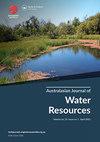Regional analysis of PROQ transforms for flood frequency estimation based on GRADEX principles
IF 2.2
Q2 WATER RESOURCES
引用次数: 2
Abstract
ABSTRACT The PROQ transform which converts rainfall P to runoff RO, then factored to produce peak discharge Q, can be used for regional design flood estimation. SPEED, a French method based on GRADEX principles is a PROQ transform. 1 in 100 annual exceedance probability discharges was estimated using SPEED for 40 Australian non-urban catchments. Inputs are catchment area and areal design rainfall depth. The SPEED transform involves three constant parameters: scaling factor a, non-linearity b and retention L. SPEED was found to be simple and effective (Nash-Sutcliffe E = 0.82). A local version of SPEED produced a similar performance (E = 0.74). A general form of PROQ was developed to explain similarities with other models such as the Probabilistic Rational Method and to develop the local SPEED transform. Gauge sites can be grouped based on a and L ‘bins’, using site-based mean values of these parameters. A PROQ model using two a bins and two L bins significantly enhanced predictive accuracy (E = 0.92).基于GRADEX原理的洪水频率估算PROQ变换的区域分析
PROQ变换将降雨P转化为径流RO,经因子分解得到峰值流量Q,可用于区域设计洪水估算。SPEED是一种基于GRADEX原理的法国方法,是一种PROQ变换。使用SPEED对40个澳大利亚非城市集水区进行了年度超额概率排放估计。输入是集水区面积和区域设计降雨深度。SPEED变换包含三个常量参数:比例因子a、非线性b和保留率l。SPEED变换简单有效(Nash-Sutcliffe E = 0.82)。本地版本的SPEED产生了类似的性能(E = 0.74)。开发了PROQ的一般形式来解释与其他模型(如概率理性方法)的相似性,并开发了局部SPEED变换。测量站点可以根据a和L“箱”进行分组,使用这些参数的基于站点的平均值。使用两个A仓和两个L仓的PROQ模型显著提高了预测精度(E = 0.92)。
本文章由计算机程序翻译,如有差异,请以英文原文为准。
求助全文
约1分钟内获得全文
求助全文
来源期刊

Australasian Journal of Water Resources
WATER RESOURCES-
CiteScore
5.10
自引率
21.90%
发文量
25
期刊介绍:
The Australasian Journal of Water Resources ( AJWR) is a multi-disciplinary regional journal dedicated to scholarship, professional practice and discussion on water resources planning, management and policy. Its primary geographic focus is on Australia, New Zealand and the Pacific Islands. Papers from outside this region will also be welcomed if they contribute to an understanding of water resources issues in the region. Such contributions could be due to innovations applicable to the Australasian water community, or where clear linkages between studies in other parts of the world are linked to important issues or water planning, management, development and policy challenges in Australasia. These could include papers on global issues where Australasian impacts are clearly identified.
 求助内容:
求助内容: 应助结果提醒方式:
应助结果提醒方式:


